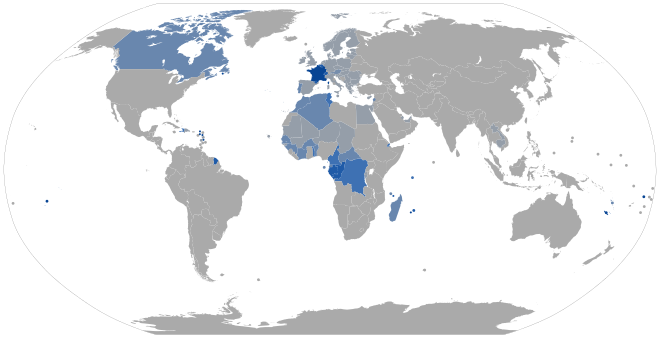The French language became an international language, the second international language alongside Latin, in the Middle Ages, "from the fourteenth century onwards". It was not by virtue of the power of the Kingdom of France: '"... until the end of the fifteenth century, the French of the chancellery spread as a political and literary language because the French court was the model of chivalric culture". Consequently, it was less as a centralising monarch than as a "gentle courtly prince" that the king unwittingly spread his language" and "the methods of expansion were not political"'.[1] This status continued to grow into the 18th century, by which time French was the language of European diplomacy and international relations.[2]
The terms Francophonie or Francophone world refer the whole body of people and organisations around the world who use the French language regularly for private or public purposes. French is the second most geographically widespread language in the world after English, with the French-speaking world comprising about 50 countries and territories where French is a de jure or de facto official, administrative, or cultural language.[3]
According to the 2022 report of the Organisation internationale de la Francophonie (OIF), 321 million people speak French.[4] The OIF states that despite a decline in the number of learners of French in Europe, the overall number of speakers is rising, largely because of its presence in African countries: of the 212 million who use French daily, 54.7% are living in Africa.[5] The OIF figures have been contested as being underestimated due to the methodology used and its strict definition of the word francophone. The French Conseil économique, social et environnemental estimate that were they included, the total number of French speakers passed 500 million in the year 2020.[6]


- ^ Léonard Dauphant, Le Royaume des quatre rivières. L'espace politique français (1380-1515). Paris, Champ-Vallon, 2012, p. 217, quoted in Thierry Dutour, La France hors la France. L’identité avant la nation, Editions Véndémiaire, 2022, p. 62
- ^ "Why Is French Considered the Language of Diplomacy?". Legal Language Blog. Retrieved 28 November 2021.
- ^ "The world's languages, in 7 maps and charts". The Washington Post. 18 April 2022. Retrieved 19 April 2022.
- ^ "Qui parle français dans le monde – Organisation internationale de la Francophonie – Langue française et diversité linguistique" (in French). Retrieved 25 November 2023.
- ^ "La langue française réunit 274 millions de personnes dans le monde". RTBF Litterature. Archived from the original on 7 January 2015. Retrieved 29 April 2015.
- ^ "Discours". La voix de la diversité. Organisation internationale de la Francophonie. Archived from the original on 16 May 2013. Retrieved 30 December 2017.
- ^ a b OIF 2022, pp. 30–35.